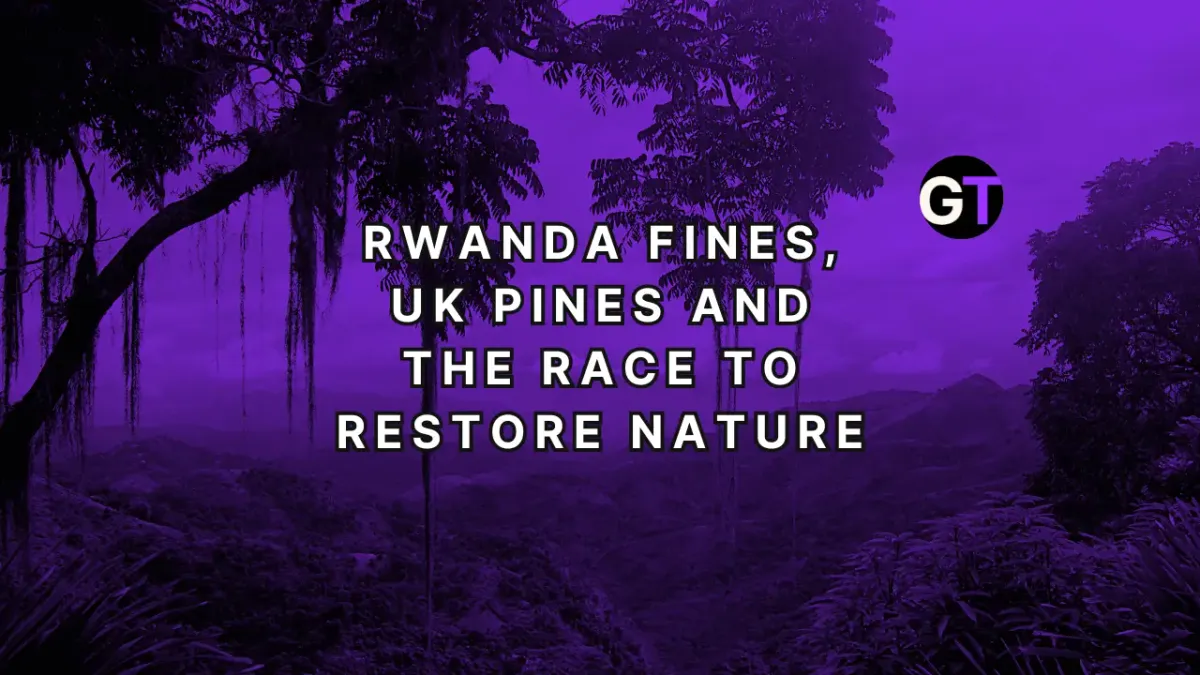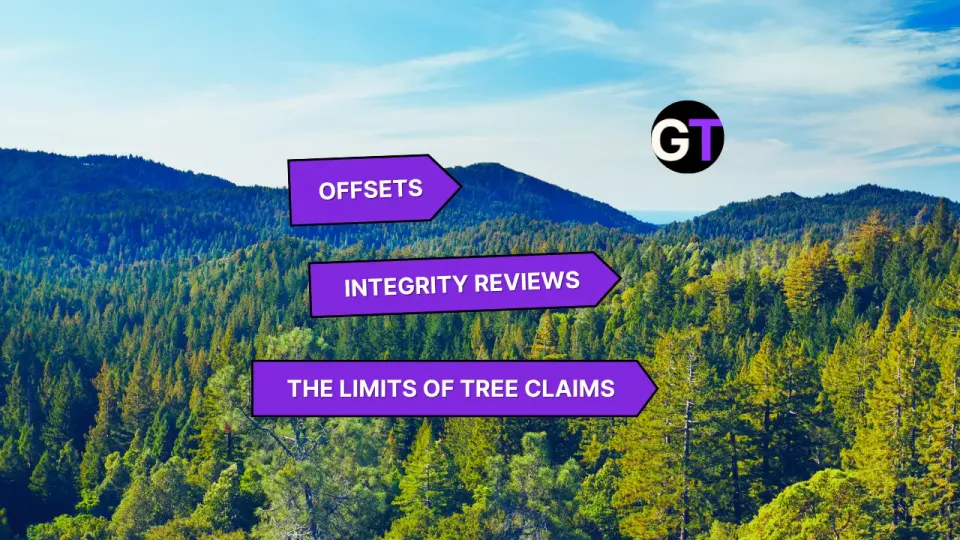Rwanda Fines, UK Pines & the Race to Restore Nature
Forest funds, carbon markets, and biofuel thinnings—where climate finance gets muddy, murky, and occasionally miraculous.

Defra Backs New Forest Defence: £4M to Fortify UK Treescapes
Defra is pumping £4 million into the Centre for Forest Protection for 2025–26, funding 17 fresh research projects aimed at safeguarding UK trees from a triple threat: climate change, pests, and disease. With forests contributing £4.1 billion annually to the UK economy and providing flood mitigation, biodiversity, and wellbeing, protecting them is non‑negotiable. The portfolio includes cutting-edge work on ash dieback and emerald ash borer resistance, drought-resilient mixed planting, genomic studies into tree resilience, early warning systems for diseases, and even tackling grey squirrel bark-stripping. It’s a united front from Forest Research, Kew Gardens, and other partners—bringing real science to bolster our woodlands.
💬 With pests, pathogens, and warming temps pressing our forests, can this research lineup build resilient treescapes that stand the test of time?
👉👉 Read the full announcement via Centre for Forest Protection
USDA Drops $80M to Rev Up Timber, Jobs & Forest Resilience
The U.S. Forest Service just rolled out $80 million in Wood Innovation Grants to spark timber manufacturing, fuel forest-based energy, and supercharge wildfire mitigation. Secretary of Agriculture Brooke Rollins framed the move as a cornerstone of the “America First” agenda—aimed at cutting red tape, creating rural jobs, and restoring forest health. The grants back everything from cross-laminated timber tech to small-diameter wood utilization, giving timber towns a boost while tackling the gnarly mess of overgrown, fire-prone forests.
💬 Is this timber-centric stimulus a win-win for forest health and rural economies—or just old-growth economics in new packaging?
👉👉 Read the full release via USDA
Pine Thinnings & Biofuel Dreams: Qarlbo’s Sustainable Forestry Play
Qarlbo Biodiversity has signed an agreement with Woodland Biofuels to supply up to 500,000 tons of sustainably harvested pine thinnings from its U.S. forest properties. Managed under Qarlbo’s Nature+® Forest Management Strategy, the biomass aims to support carbon-negative fuel production while restoring native ecosystems and generating biodiversity credits. The deal blends clean energy goals with regenerative land stewardship, highlighting how thinning—often overlooked—can become a cornerstone of climate-smart forestry and biofuel supply chains.
💬 Can thinning-based biomass markets help scale nature-positive forestry without compromising ecosystem integrity?
👉👉 Read the full press release
Mid-Year Carbon Credit Pulse Check: Prices Up, Scrutiny Tighter
From rising retirements to shrinking over-crediting risk, Calyx Global's latest snapshot shows the Voluntary Carbon Market growing smarter—slowly. Issuances may have dipped 9% in early 2025, but credit quality is inching upward. Tier 1 credits now command a 65% premium over Tier 3, driven by afforestation and landfill gas darlings. Meanwhile, the ICVCM’s CCP label—though sluggish—still helps separate the carbon wheat from the chaff. But spoiler alert: only 3.3% of rated credits even qualify. TL;DR: Quality pays, but due diligence is still the name of the game.
💬 Are carbon markets finally valuing integrity—or just learning to fake it better?
👉👉 Read the full analysis at Calyx Global
Canada Launches Wildfire Resilience Consortium with $11.7M Boost
Canada is stepping up wildfire defence with an $11.7 million, four-year investment to launch the Wildfire Resilience Consortium of Canada (WRCC), a virtual hub for flame-fighting innovation under the Wildfire Resilient Futures Initiative. The WRCC isn’t just another government acronym—it’s a cross-sector mashup of G7 strategy, Indigenous knowledge, and fire science. Think of it as Canada's new think-and-do tank for wildland blazes. With temperatures soaring and smoke on the move, the consortium hopes to translate big data and local know-how into smarter, faster fire response.
💬 Canada’s forests are heating up. Can this new cross-sector brain trust actually cool things down before the next smoke season rolls in?
👉 Read the full announcement via Canada.ca
Sustainable Provenancing for Resilient Trees
How do you climate-proof a forest? Drs. James Borrell (RBG Kew) and Nadia Barsoum (Forest Research) are turning to genomics, satellite data, and massive field trials to crack the code. Their £245K project aims to match oak and birch seed sources with future UK climate zones—complete with adaptive genetic maps, species recruitment analysis, and planting best practices. It's science that could reshape tree planting for decades… if the data is shared.
💬 With climate risks rising, could fully open genomic and afforestation data accelerate smarter, more resilient tree planting across the UK?
👉👉 Read more via the Centre for Forest Protection
Rwanda Goes Digital: Turning Fines into Forests
Rwanda’s REMA, backed by UNDP’s BIOFIN, has launched IremboPay, a digital platform that issues environmental fines via mobile and channels payments directly into reforestation, wetland restoration, and education projects managed by FONERWA. Since October 2024, over $122,000 has been collected—turning penalties into ecological progress. By automating issuance, tracking, and reinvestment, this system boosts transparency, accountability, and environmental impact at each step.
💬 Can Rwanda’s smart-fine model—linking violators directly to restoration funds—serve as a blueprint for nations tackling biodiversity finance and enforcement at scale?
👉 👉 Explore more via BIOFIN
Carbon trading platform set for trial run by end of year
Vietnam is fast-tracking a domestic carbon market debuting in pilot form by the end of 2025—part of its net-zero-by-2050 roadmap. With over 40 million carbon credits already issued through about 150 projects, and global CDM leadership, the country is building a legal and technical backbone to support both domestic and international carbon trading by 2029. As aviation and shipping sectors brace for offset obligations and exporters face EU carbon taxes, the stakes are real—and high.
💬 As Vietnam gears up for its pilot carbon platform, how critical is domestic transparency and integration with global standards for it to succeed and shield businesses from hefty carbon tariffs?
👉 👉 Read the full story via Vietnam Investment Review
G20 Grants to Grow Grassroots: Civil Society Gets a Restoration Boost
The G20 Global Land Initiative is back with round two of its Restoration Return Grants, aimed squarely at scaling up civil society's role in healing the planet. With a goal to restore over 1 billion hectares by 2030, this small-but-mighty grants program supports local organizations tackling land degradation through community-led solutions. Rooted in the 2020 Saudi G20 presidency, the program recognizes that fighting desertification isn't just a top-down policy game—it’s a grassroots movement with global consequences.
💬 Will expanding civil society funding be the secret ingredient to restoring a billion hectares—or just a drop in a very dry bucket?
👉 👉 Find out more via the G20 Global Land Initiative
Rainforest Trust Opens Grant Applications for Conservation Projects
Rainforest Trust is now accepting proposals for projects that aim to protect high-biodiversity tropical and subtropical areas—through feasibility studies or formal protected area creation. Since 1988, they’ve backed over 315 partners and helped safeguard 55 million acres. There are two funding streams: small Feasibility Awards (avg. $10K) for early-stage work like species surveys or legal research, and larger, open-ended grants for establishing protected or conserved areas through land titling, purchase, or designation.
💬 Can international conservation dollars genuinely empower local stewardship—or just reroute global agendas through more paperwork?
👉👉 Read the full eligibility requirements at Rainforest Trust

Edited by Chris Harris

This work is licensed under a
Creative Commons Attribution 4.0 International License.





